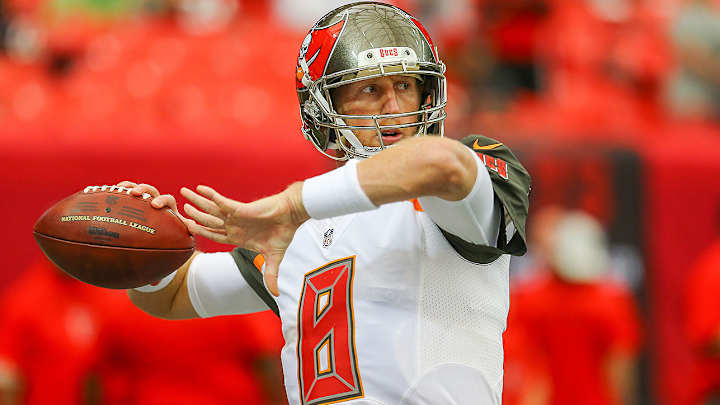The Bears' confusing commitment to Mike Glennon clouds their future QB plans

Acquiring a starting quarterback who’s beyond his rookie contract for less than $15 million is, within the current NFL landscape, very difficult—22 of the league’s starters make $16 million or more, and even a relatively unwanted Ryan Fitzpatrick raked in $12 million last off-season.
The questions for the Bears now: 1) Did they sign themselves, in Mike Glennon, a legitimate starting NFL quarterback for $14.5 million per year? 2) Is he better than the $14.3 million QB they already had on their roster?
They had in their possession one Jay Cutler, who has made 102 starts for Chicago over eight seasons. He will turn 34 in April, but he has just $2 million in guaranteed money left on his contract, which technically runs through 2020. The Bears could have rolled into ’17 with Cutler at a cap cost of less than $15 million, per OvertheCap.
They opted instead to release Cutler on Thursday and entrust the offense to Glennon. At 27, the ex-Buc is younger than Cutler, but he has not started a game since 2014 and he will be making a low-level starter’s salary. So they better be very sure of what they’re actually getting here in Glennon, because their ’17 hopes—and likely the Chicago futures of coach John Fox and GM Ryan Pace—are now tied to their new 6' 7" quarterback.
With the luxury of choice, Tony Romo's free agency should be a two-team race
The Bears hold the No. 3 pick in this year’s draft, and nabbing a QB there may have been Plan B to adding one via free agency. They still could use that selection on a quarterback, although their investment in Glennon makes it far more likely that they seek out a developmental prospect with a later pick (they hold Nos. 36, 67, 111 and 117 in Rounds 2 through 4).
Which, again, places the onus squarely on Glennon to be the right choice for the Bears in the immediate future. He could be. Anyone pretending to know for sure is working on faith.
“[We look for] a guy that raises all boats, as far as work ethic,” Bears coach John Fox said at the combine, when asked about what he wants in a QB. “When the horn goes off, he’s not in track shoes [racing] out of the building. Same way, we call it, first-in, last-to-leave type of mentality. That raises all boats with your teammates.
“Successful teams I’ve been a part of had that intangible, and that’s something we’re trying to build on. This year was tough, just because there was a point where the first two rows of our team room were filled with quarterbacks. That’s never a good sign.”
To Fox’s point, among the reasons the Bears reached a breaking point on Cutler is that he missed 11 games last season to injury. He has not played all 16 games of a regular season since 2009, and any lingering health worries do not tend to improve when a player reaches his mid-30s.
On the other hand, Glennon has all of 18 career NFL starts to his credit, none the past two years as he held a clipboard behind Jameis Winston. He was decent in those appearances but hardly set the world on fire: 58.8% completion rate, 29 TDs, 15 INTs and a 5–13 record as a starter in Tampa Bay.
The Buccaneers drafted Glennon in Round 3 of the 2013 draft, then tossed him into the lineup four weeks into that season after Josh Freeman faltered. Glennon could have benefited from more time to sit and learn. He’s had that opportunity over the past two-plus seasons.
Chicago is banking on that experience, both as a starter and backup, readying Glennon to take over an offense again. It’s a substantial gamble by a team that could have used its draft collateral instead to seek out a franchise quarterback. Grade: C

Chris Burke covers the NFL for Sports Illustrated and is SI.com’s lead NFL draft expert. He joined SI in 2011 and lives in Ann Arbor, Mich.